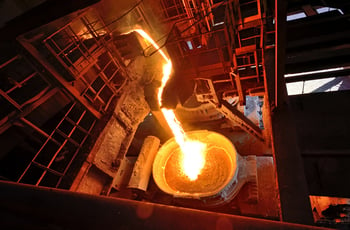 There are a number of manufacturing processes used in different industries that rely on extremely high temperatures to achieve a specific goal—whether that goal is sterilizing parts, changing their physical properties, or even melting parts for reprocessing into a new form.
There are a number of manufacturing processes used in different industries that rely on extremely high temperatures to achieve a specific goal—whether that goal is sterilizing parts, changing their physical properties, or even melting parts for reprocessing into a new form.
The issue is that the extreme temperatures used in these processes can have a significant impact on the containers that hold the parts being processed. For example, some temperature-resistant plastics can withstand temperatures around 700°F (371°C) before melting—but a heat treatment process might use temperatures of 1,600°F (871°C) or more.
However, polymers aren’t the only materials available for making custom wire baskets or other containers. There are numerous metal alloys that are specifically formulated to have extremely high resistance to heat—such as Inconel 625®. One question that many people have about Inconel® alloys is “what is the melting point of Inconel®?”
The Melting Point of Inconel 625®
Measurements of the melting point of Inconel 625® vary slightly, but statistics reported by Matweb.com put the range for the melting point of the alloy between 2,350°F and 2,460°F (1,290°C and 1,350°C).
At these temperatures, Inconel 625® will melt. However, the melting temperature isn’t actually the best measurement of the appropriate use temperature for a metal alloy.
Why Melting Point Isn’t the Most Important Statistic
Even below the melting point, many alloys will lose a significant portion of their tensile strength, or may experience significant alterations to their physical properties.
For example, at room temperature the ultimate tensile strength of Inconel 625® is, as pointed out in the Matweb.com information, 128 ksi (880 MPa) when annealed—other sources rate the tensile strength at 140 ksi (965.3 MPa). At temperatures of 2,000°F (1,093°C), Inconel 625® has a tensile strength of roughly 13.3ksi (91.7 MPa). This is around a tenth of the metal’s room temperature strength.
This is part of the reason why Inconel® is generally recommended for processes up to 1,800°F (982°C) instead of temperatures that are closer to its melting point.
Another important consideration beyond the melting point of metal is how well it can withstand the other stress factors in your production process. For example, will the basket/tray be exposed to any acids, alkalis, or organic compounds? If so, for how long and at what concentrations? Will the basket/tray be exposed to heavy loads or strong impacts? How often and where will the impact fall?
It isn’t enough to just have a basket that’s made out of materials that can take the heat—they also have to be able to take every other stress factor at the same time.
Using Virtual Tests to Verify Basket Designs
To make sure that every custom basket or tray that Marlin Steel manufactures can stand up to their intended use conditions, Marlin’s engineering team runs every design through a series of virtual physics simulations based on the stress factors reported by the client in a custom basket questionnaire.
Using these simulations, the engineering team can check to make sure whether or not the design of a basket can survive repeated use by the client. A design will be marked as a failure if it would suffer a deviation as little as the width of a human hair. If a design fails, the cause of the failure is logged and the design is modified to address that problem—and this process is repeated until a design is created that can withstand all of the stresses that it will be subjected to for years of use.
The best part of this virtual testing process is that it is incredibly fast compared to the traditional method of making a prototype basket and running tests. Making a prototype basket, sending it to the client, and letting them rigorously test the design can take weeks—a virtual test takes minutes. Running three rounds of revisions with a prototype could take months while three rounds of revisions with virtual tests could be completed in an afternoon.
While the virtual testing helps Marlin’s engineering team to verify the viability of a design, it is their years of experience in designing and building custom metal forms that helps them narrow down the best custom basket materials for a given job to a few candidates. This, in turn, helps them to quickly create and adapt designs based on the use conditions the basket is being made for—including high-temperature applications such as annealing parts.
Learn more about the properties of various metal alloys by checking out Marlin’s Stainless Steel Properties Sheet at the link below. Or, contact us for a custom basket quote today!



.gif)


